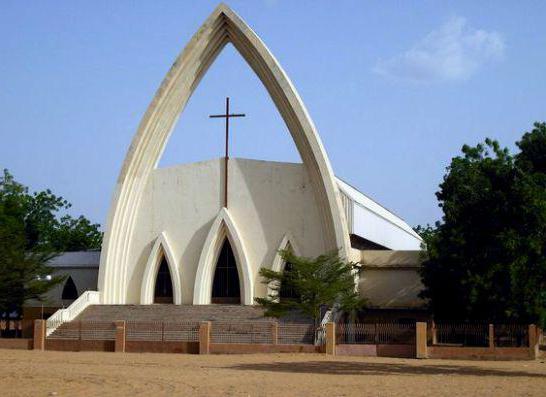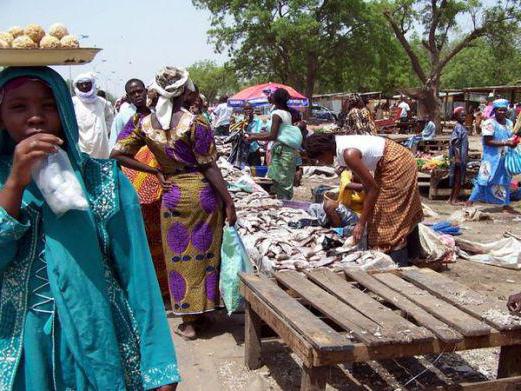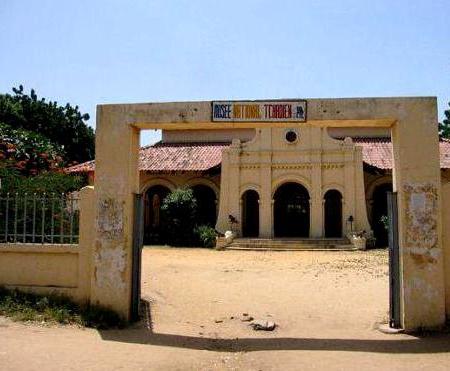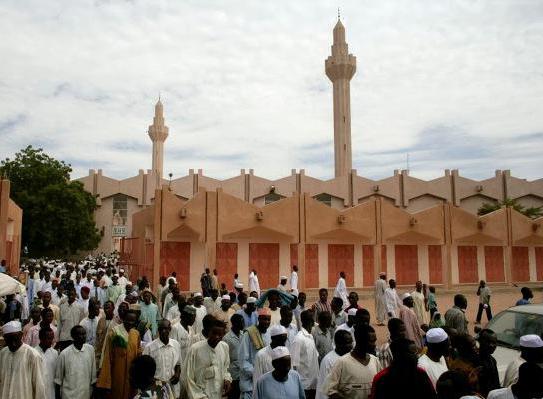Most of us are familiar with the African continent in Egypt and Tunisia. But there are other states that deserve attention. Mass tourism has not yet gained momentum in them; there is no developed tourism industry there, but, despite some difficulties that may arise, a trip to these countries will be filled with vivid impressions. We suggest you take a virtual trip to Chad, a state in Central Africa. The capital of this country, N'Djamena, is very distinctive. A walk along it will certainly surprise you. The city and its environs have many interesting, and sometimes unique sights, a visit to which will be remembered for a lifetime.
Location
The State of Chad is located in Central Africa , surrounded by countries such as Niger, Cameroon, Nigeria, Libya, Sudan and the Central African Republic. Chad has no access to the ocean or sea. In the north, the country adjoins the Sahara desert. There are very few water sources, and those that are are seasonal. In the south there are many small and large rivers, there are lakes. The capital of Chad is located in the southwestern part of the state, on the banks of the Shari River, not far from the place where Logon flows into it, very close to the border with Cameroon. The city has an international airport, so it’s easy to get here from Russia. A visa is required.
A brief excursion into history
In Chad, people lived several thousand years ago. In confirmation of this, they found the skull of the most ancient man on Earth. At the end of the 14th century, the state of Borno was formed near the Shari River . It was founded by the inhabitants of Kanem, who fled after the defeat of their country by tribes of nomads. In Borno, among other things, engaged in the slave trade. At the very end of the 19th century, he was conquered by the Sudanese military commander Rabih-az-Zubair, who was able to control him for seven years. In 1900, this site of land was liked by the French, who, using weapons, expanded their influence in Africa. Near the city of Kusseri, a battle ensued, as a result of which the Rabbi was captured and beheaded. The French won, but also suffered losses. On their side, one of the commanders, Francois Lamy, was killed. This happened on April 22, and on May 29 opposite Kusseri, on the other side of the Shari, laid the first stone of the new city - Fort Lamy. The capital of Chad had such a name for 73 years, and only then it was renamed N'Djamena, which means "place of rest." Throughout its short history, N'Djamena has been a participant in military conflicts many times. The latter occurred in 2008. And although everything is calm there now, and the locals are good-natured and smiling, they have a lot of weapons in their hands, which our tourists must take into account.

Where to stay
Numerous military operations and a not very favorable climate made Chad one of the poorest countries in Africa. The capital, N'Djamena, is its largest city with almost a million inhabitants. But here there is no abundance of modern high-rise buildings and developed infrastructure, relying on capitals. Even with the hotels here, let's say, not a lot. The entire city has only a few four- and five-star hotels. The rooms in some correspond to the European category of "3 stars" and below, and the price for a room is at least 100 euros per night. There are a couple of hostels in N'Djamena where the prices are half as low, but it is not recommended to settle there. The hotels Kempinski, Le Meridien, Le Sakhel positively marked by tourists.
Nutrition
The capital of Chad, N'Djamena, cannot offer a wide selection of first-class restaurants. But among the available ones there are even Chinese ones, where, like almost everywhere in the capital, pork dishes are served. In general, in Chad they cook a variety of delicious dishes from rice, potatoes, corn, cassava, millet, sorghum, and legumes. Meat and river fish, for example, Nile perch, tilapia, okra, eels , are especially popular . Fish is salted, dried, smoked, grilled on charcoal and cooked in exotic spices. You can have a meal not only in restaurants, but also just on the street, where right before your eyes a lively merchant will bake a fish you like on charcoal and season it with your chosen sauce. While in N'Djamena, you should definitely try salanda (goes well with beer), a gang, gambo sauce, and bule pasta. Of the drinks here, they drink everywhere the familiar hibiscus, but they make it with various spices (cinnamon, vanilla, cloves). This is called karkanji. Of the alcoholic drinks in N'Djamena, local beer that is not exported is popular. Therefore, you can try it only in Chad. Fans of vitamins will certainly enjoy the fruit cocktail “jus-de-frut”, in which, in addition to fresh fruit, there is milk and cardamom. In general, in Chad, few fruits are grown because of the harsh climate. These are mainly dates and raisins. The bulk of the rest is imported, which is why their prices are higher than in Moscow.

Walking the streets of the capital
The capital of Chad received the name N'Djamena from a nearby small village. This happened under President Tombalbay, who was zealously pursuing a policy of Africanization in the country. He, in turn, was also killed. Now Idris Daby, the always winning election, rules here. Before independence, Chad was a French colony, so many streets and squares bore French names. Now there are few of them, among them there is, for example, Charles de Gaulle Avenue. This is one of the main streets where there are embassies, several banks, new offices and beautiful modern houses are built. It stretches to the circle-square, bearing the name of Sultan Kasser. The general appearance of the street is quite pleasant, since in almost every building the first floor is made with arcades, that is, the architecture is given the appearance of completeness. But the farther from the center, the views of the capital are becoming sadder. Modern stone houses are gradually replaced by old mud houses, and on the outskirts they are replaced by huts covered with reeds. Nevertheless, the city center is beautiful. Here you can see many interesting sculptures and monuments, there are several churches built in the colonial period. Tourists are always delighted with multi-colored lizards, found on the roads as often as we have cats and dogs.

Shopping
In N'Djamena, as in all of Chad, there are no metro, trams or trolley buses. Move here only on antediluvian buses and taxis. Sellers carry their goods in large open carts, so spontaneous outlets can occur anywhere. They work even at night. These people sleep here, on the street, making themselves a bed of cardboard boxes. In supermarkets and shops of the capital, the goods are mainly imported and very expensive. Therefore, for shopping, you can advise the markets. Central is even included in the list of attractions that the capital of Chad boasts. Photo captures a fish corner in the market. It is noisy, dirty and you can bargain. Since the colonial times in Chad, the official language is French. Therefore, tourists who own it have no difficulties with communication. In addition to French, in N'Djamena they speak Arabic, as well as many local dialects, but English is not popular here. There are almost no souvenirs, masks and other exotic items on the Central Market. On the Big Market (or Grand March), which is opposite the mosque, with this good is better. There is another small tourist-oriented market in the capital. He is on the way to the airport. This is where you can buy African exoticism in the form of figurines, masks, all kinds of crafts, amulets and other things.

Museum
The capital of Chad on its territory has not many attractions. The National Museum is perhaps the most important. It is located opposite the oldest in the city and almost always closed Cathedral, which stands out against the general background of buildings with its unusual architectural forms. The museum building is outwardly unattractive. This is the former administrative center of the city. It was converted into a museum in 1963. At the entrance, you can and should buy a guide to the museum, because you can’t photograph exhibits there. Among them are many local-made utensils from household goods of the inhabitants of the colonial and pre-colonial Chad, skeletons of animals found during excavations, some artifacts, fragments of rock paintings of primitive Africans, many unique objects of the Sao people, tubu, and zagawa. Next to the museum is Place de la Nation Square with an unusually interesting design of the complex of memory of fighters for national freedoms. But foreigners are not always allowed to walk there.
Big mosque
N'Djamena, the capital of Chad, is a city where most residents practice Islam. In 1978, with the help of French experts, the Great Mosque was built here, which has become a landmark of the city. It is located near the Big Market and the police station. Outwardly, there is nothing unusual or unexpected in the architecture of the mosque, but for believers this is the most important place in the city.
Nature reserves and parks
A few bright sights can please the capital. Chad is a country where it will be very curious for Europeans to look at the natural world and the distinctive culture of the African people. Therefore, the most interesting places are located outside the capital. A unique excursion can be made to the reserve "Binder-Lere" (Binder-Lere), located relatively close to N'Djamena. I must say that the distances here are measured in hundreds of kilometers. For example, to "Binder-Leray" about 300 km in a straight line. In the reserve you can see a waterfall, two lakes (Tren and Leray), many unique birds and plants.
The second nature reserve that you can visit is Mandelia, which is also curious about its natural resources. The third is Bahr Salamat. But before him as much as 800 km. But nearby is the second most important natural park of Chad - "Zakuma", where you can see nearby free-walking exotic for us elephants, giraffes, lions and dozens of other animals. A little closer, just 550 km away, is the Manda Park, which is unusually popular with tourists. And if you don’t want to go so far, you can buy a walk along the Shari River, admire the crocodiles and hippos, take a trip to the Elephant Rock cliffs resembling elephants.
Cities and towns
The capital of the state of Chad (N'Djamena) is a relatively young city. But tourists want to see antiquity. To do this, you need to go to neighboring settlements. The most picturesque and interesting is the city of Abeche, to which there are more than 600 kilometers from N'Djamena. The city is notable for its architecture, mosques, the preserved palace of the Sultan. There is also a local airport, so you can get there quickly if you wish. The city of Sakha, located more than 500 km from the capital, is interesting for its museum and the fact that several national parks are located nearby. The village of Gaui is much closer, only 10 km from the capital. Presumably, giants lived here. Now in the village you can see unusual round houses, as well as exhibits of the local museum, placed here after archaeological excavations.
Reviews
Little is known to our tourists about Chad. The capital of which country is N'Djamena, few people know. If you are going to discover this original and completely unlike any other region, you must definitely get a series of vaccinations before the trip - from cholera, hepatitis A and B, malaria, diphtheria, tuberculosis, typhoid, tetanus, meningitis and polio. Features of a stay in Chad, often noted by tourists:
- Paying with credit cards is almost impossible here, only in cash. Chad's currency is the franc (XAF).
- Given the special mentality of the inhabitants of Chad, it must be borne in mind that photographing is not even welcome here in the capital. Locals believe that the camera takes power, health, soul and so on from them, so serious problems can arise.
- Water from the tap is not suitable even for washing, you can’t drink it, of course.
- The weather in the region where N'Djamena is located is, let's say, not cold. In summer, about +45 in the shade and without rain, in winter at least +22 and with rare but heavy rains.
And the rest of the trip to this exotic country causes only positive emotions.